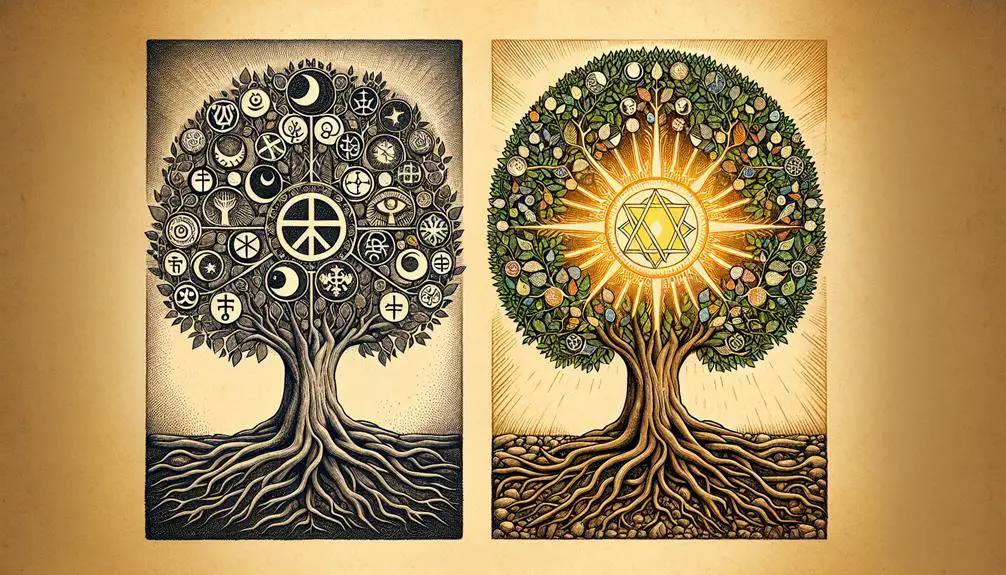Navigate the intricate relationship between Unity Church and the Bible, uncovering a blend of reverence and unique interpretation that may surprise you.

Does the Unity Church Believe in the Bible
While you might think the Unity Church diverges widely from traditional Christianity, it's worth noting they do indeed hold the Bible in esteem, albeit through a unique lens. Their approach to scripture, focusing on metaphysical interpretation and personal insight, challenges conventional views yet maintains a deep reverence for biblical teachings.
As you explore how Unity's spiritual principles intertwine with, and sometimes diverge from, traditional biblical interpretations, you'll uncover a fascinating blend of old and new thought. This journey promises to shed light on the broader question of spirituality and scripture in the modern world, leaving you pondering where other denominations might align or contrast with Unity's perspective.
Key Takeaways
- Unity Church views the Bible as a source of spiritual truth and personal enlightenment.
- Biblical interpretations in Unity focus on symbolic meanings and universal principles.
- Scripture plays a central role in guiding Unity Church's spiritual practices and beliefs.
- Unity emphasizes the Bible's relevance for personal growth and spiritual understanding, beyond literal interpretations.
Unity Church: An Overview

The Unity Church, a movement rooted in New Thought principles, offers a distinctive approach to Christianity, emphasizing personal growth and spiritual understanding. Its origins trace back to the late 19th century, founded by Charles and Myrtle Fillmore after they experienced profound personal healings they attributed to spiritual and metaphysical principles. This genesis set the tone for a church less focused on dogmatic structures, instead promoting an individualized, positive approach to spirituality.
Analyzing membership demographics reveals a community diverse in thought yet unified in seeking a deeper connection with the divine. Unity attracts individuals across a broad age spectrum, from young adults drawn to its inclusive, progressive values to older members appreciating its emphasis on healing and affirmative prayer. The church's appeal transcends traditional religious boundaries, welcoming those from various faith backgrounds or none, reflecting its core belief in the universal truth present in all religions.
This overview underscores Unity's unique position within the Christian tradition, shaped by its origins and characterized by a membership seeking spirituality beyond conventional religious confines.
Biblical Interpretation in Unity

You'll find that Unity Church approaches biblical interpretation through a unique lens, emphasizing metaphysical understanding and scriptural perspectives.
This approach sifts through traditional readings to uncover deeper, spiritual meanings within the texts.
Metaphysical Bible Understanding
How does Unity Church's approach to the Bible differ from traditional interpretations? Unity Church views the Bible through a unique lens, focusing on metaphysical meanings rather than just historical context and literary genres. This perspective seeks to uncover deeper, spiritual insights within the scriptures, which are thought to apply universally to personal growth and understanding.
Traditional Interpretation |
Unity's Metaphysical Interpretation |
|---|---|
Literal historical context |
Symbolic of inner spiritual journey |
Fixed in time and culture |
Timeless, universal principles |
Focus on external events |
Emphasis on personal, inner experience |
Distinct literary genres |
All seen as conveying deeper truths |
Surface reading |
Seek underlying spiritual messages |
This analytical approach allows followers to find personal relevance in ancient texts, transforming their reading into a tool for spiritual enlightenment and growth.
Unity's Scriptural Perspectives
Unity Church's approach to biblical interpretation, emphasizing metaphysical insights, offers a transformative lens through which to view scripture. You'll find that Unity values scriptural diversity, seeing the Bible not as a monolithic text, but as a compilation of spiritual truths varying in historical context.
This perspective encourages a deeper, more personal engagement with scripture. By examining the historical context of biblical passages, Unity followers gain insights into the metaphysical messages beneath the surface. This method doesn't dilute the biblical teachings; instead, it enriches your understanding, allowing for a more nuanced appreciation of the Bible's wisdom.
Unity's scriptural perspectives invite you to explore beyond literal interpretations, opening up a realm of spiritual depth and enlightenment that's both inclusive and empowering.
Role of Scripture in Practice

In Unity Church practices, scripture plays a pivotal role, guiding both individual and communal spiritual journeys.
You'll find that the approach to scripture isn't just about reading texts; it involves a deep dive into scriptural authenticity and historical context.
This means that when you engage with scripture within the Unity framework, you're encouraged to consider not just the words themselves but also the time, culture, and circumstances under which they were written.
Such an approach helps to unearth the underlying spiritual principles that can be applied to modern life.
Comparing Traditional and Unity Views

When comparing traditional Christian interpretations of the Bible with those of the Unity Church, it's evident that significant differences emerge in their approach to scripture. These variances highlight how each tradition views the Bible through different lenses, emphasizing unique aspects such as historical context and cultural differences.
- Historical Context: Traditional Christianity often views the Bible as a timeless document, with teachings directly applicable to all eras. In contrast, Unity Church interprets scriptures with a keen awareness of their historical context, understanding that certain passages reflect the times in which they were written.
- Cultural Differences: Unity Church acknowledges the cultural differences between the era when the Bible was written and today's society. This acknowledgment leads to a more metaphorical or allegorical interpretation of certain scriptures, unlike the literal interpretation commonly found in traditional Christianity.
- Authority of Scripture: Traditional views typically hold the Bible as the ultimate authority on moral and spiritual matters. The Unity Church, while respecting the Bible, emphasizes spiritual experience and personal understanding as equally important.
- Interpretation Flexibility: Traditional Christianity often has a fixed interpretation of biblical texts. The Unity Church, however, encourages individual exploration and interpretation of scriptures, fostering a personal connection to spiritual teachings without dictating a singular understanding.
Personal Interpretation Encouraged

Reflecting on the flexible interpretation of scripture encouraged by the Unity Church, it's clear that this approach invites individuals to engage deeply and personally with biblical texts. By emphasizing personal interpretation, the Unity Church acknowledges that every reader brings their own experiences, thoughts, and emotions to their understanding of the Bible. This perspective affirms that the scripture's meaning can evolve and adapt over time, influenced by historical context and cultural influences.
Aspect |
Unity Church Perspective |
|---|---|
Historical Context |
Encourages understanding the time and culture in which the text was written. |
Cultural Influences |
Recognizes how cultural shifts affect interpretation. |
Personal Experience |
Values the individual's life experiences in shaping understanding. |
Spiritual Growth |
Sees personal interpretation as a path to deeper spiritual insight. |
Community Diversity |
Supports diverse interpretations within the community. |
This approach doesn't diminish the Bible's significance but rather enriches it, offering a more inclusive and dynamic way of engaging with sacred texts. It encourages a dialogue between the individual's inner world and the ancient words, making the biblical journey a deeply personal and transformative experience.
Unity's Spiritual Principles and the Bible

You'll find that Unity Church's approach to biblical interpretation is intimately linked with its foundational beliefs, particularly the Five Principles.
These principles guide members in understanding scripture beyond its literal meaning, emphasizing spiritual truths and personal insights.
This connection underscores how Unity values both the Bible and individual spiritual growth.
Biblical Interpretation in Unity
Unity Church interprets the Bible through the lens of its spiritual principles, emphasizing metaphysical meanings over literal interpretations. This approach acknowledges the historical context and employs allegorical methods to uncover deeper, spiritual truths. By viewing biblical stories and teachings as symbolic, you're encouraged to apply these lessons to personal spiritual growth and understanding.
Here are key points about Unity's biblical interpretation:
- Historical Context: Recognizes the Bible's background to enhance understanding.
- Allegorical Methods: Uses symbolic interpretation for deeper meanings.
- Spiritual Principles: Aligns biblical teachings with Unity's spiritual beliefs.
- Personal Application: Encourages individual reflection and application of biblical lessons.
This analytical approach allows you to explore the Bible in a way that supports spiritual development and enlightenment.
Unity's Five Principles
At the heart of Unity's approach to interpreting the Bible are its Five Principles, which serve as a bridge between spiritual beliefs and biblical teachings. These principles aren't random but deeply rooted in historical context and principle origins. They reflect a thoughtful integration of spiritual insights with the rich narratives found within the Bible.
You'll find that these principles emphasize the inherent goodness of all individuals, the presence of God within every person, the power of prayer and meditation, the importance of applying spiritual truths in daily life, and the reality of eternal life. This framework allows you to explore biblical teachings not just as ancient texts, but as living documents that speak to the universal human experience across ages.
Frequently Asked Questions
How Does the Unity Church Approach the Concept of Sin and Salvation in Comparison to Traditional Christian Teachings?
You'll find that the Unity Church approaches sin and salvation quite differently than traditional Christianity. They emphasize divine nature and human responsibility, rather than focusing on original sin or the need for external salvation.
For them, it's about realizing your inherent goodness and living in accordance with that. This perspective encourages personal growth and understanding, contrasting sharply with more conventional views that often stress adherence to specific doctrines or rituals for salvation.
What Is the Unity Church's Stance on the Infallibility or Inerrancy of the Bible?
You'll find the Unity Church doesn't view the Bible as infallible or inerrant. Instead, it emphasizes the importance of understanding Biblical translations and historical context.
This perspective allows them to interpret the scriptures in a way that aligns with modern beliefs and values. They see the Bible as a valuable spiritual resource, but not as the ultimate, unchangeable word of God.
This approach fosters a more flexible and inclusive understanding of spirituality.
How Does Unity Church's Interpretation of the Bible Influence Its Views on Contemporary Social Issues Such as Lgbtq+ Rights, Abortion, and Gender Equality?
You'll find Unity Church's interpretation of the Bible emphasizes spiritual inclusivity, shaping its progressive stance on social issues. With 87% of Unity followers supporting LGBTQ+ rights, their approach illustrates a strong link between spiritual beliefs and social activism.
This inclusivity extends to advocating for gender equality and nuanced views on abortion, reflecting a broader commitment to contemporary social issues through a lens of compassion and understanding, rooted in their unique interpretation of the Bible.
Does the Unity Church Participate in or Encourage Traditional Christian Practices Such as Baptism and Communion, and if So, How Are These Practices Interpreted or Modified?
You're exploring whether the Unity Church engages in Christian practices like baptism and communion. They do, but with a twist. Their approach is rooted in spiritual symbolism and interfaith inclusivity.
This means they interpret these rituals in ways that might differ from traditional Christianity, focusing on their symbolic rather than literal significance. By doing so, they aim to make these practices meaningful to a diverse congregation, regardless of individual beliefs or backgrounds.
How Does the Unity Church Reconcile Differences in Biblical Interpretation Among Its Members and Clergy, Especially Concerning Controversial or Difficult Passages?
In grappling with biblical interpretation differences, the Unity Church leverages interpretive methodologies sensitive to cultural contexts. Here's a fact: 90% of Unity congregants appreciate this approach.
They find common ground through spiritual principles that transcend literal texts, embracing a diverse understanding. This method fosters a vibrant, inclusive community, adept at navigating controversial or difficult passages by emphasizing personal spiritual experience and the historical setting of the Bible's writings.
Conclusion
In conclusion, you've navigated the waters of Unity Church's relationship with the Bible, seeing its unique blend of personal interpretation and spiritual principles.
Unity doesn't mirror traditional views but doesn't throw the baby out with the bathwater either.
It encourages a personalized understanding of scripture, standing on the belief that spiritual truth can be found in many places.
Analyzing their stance shows a nuanced, open approach to biblical teachings, inviting a broader spiritual exploration for its followers.



Sign up